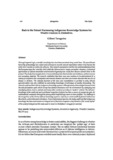Please use this identifier to cite or link to this item:
https://cris.library.msu.ac.zw//handle/11408/1845Full metadata record
| DC Field | Value | Language |
|---|---|---|
| dc.contributor.author | Tarugarira, Gilbert | - |
| dc.date.accessioned | 2016-10-18T09:24:26Z | - |
| dc.date.available | 2016-10-18T09:24:26Z | - |
| dc.date.issued | 2016 | - |
| dc.identifier.issn | 1815-9036 | - |
| dc.identifier.uri | http://hdl.handle.net/11408/1845 | - |
| dc.description.abstract | Through imperial logic, scientific knowledge has since been perceived along racial lines. The penultimate hierarchy of knowledge has created and continues to nourish natural imperialism where it has become the white men’s burden to civilize the Africans. This research attempted to sterilize the celebrated falsehood that the Europeans have the ‘scientific spirit’ while the Africans have a ‘magic conception’ of nature. A historical appreciation of African innovative and inventive ingenuity was traced from the pre-colonial times to the present. The study drew insights from a broad evidentiary base that includes oral traditions, archival sources and secondary material. The research established that aloes were and continue to be administered for a variety of complaints like constipation and venereal diseases and other non-human disorders like the cure of disease in chickens. The calendar function of the stars and constellations is ascribed to early African agriculturalists who also exhibited an astounding knowledge of techniques of weather forecasting. The research confirmed that African indigenous knowledge systems, although rarely acknowledged, have provided the solid foundation upon which Europe has claimed dominance over the environment by cataloging and classifying plants, insects, animals and many other creations according to ‘modern’ criteria. The Africans’ knowledge of the medicinal and nutritional properties of plants has been a source of commercial gain for multinational companies through bio-piracy which imperial logic seems to have justified. The challenge is the recognition of the diverse African knowledge system’s capacity to create wealth by formal institutions like schools, universities and work places. From a historical perspective, the study confirmed that indigenous knowledge has been and remains an integral part of the local ecosystem, a key element of the ‘social capital’ of the underprivileged and the main asset to invest in Zimbabwe’s struggle for survival. | en_US |
| dc.language.iso | en | en_US |
| dc.publisher | Midlands State University | en_US |
| dc.relation.ispartofseries | The Dyke;Special edition; p. 119-134 | - |
| dc.subject | Indigenous Knowledge Systems, Inventive Ingenuity, Wealth Creation, Bio-Piracy. | en_US |
| dc.title | Back to the future! harnessing indigenous knowledge systems for wealth creation in Zimbabwe. | en_US |
| dc.type | Article | en_US |
| item.openairecristype | http://purl.org/coar/resource_type/c_18cf | - |
| item.grantfulltext | open | - |
| item.languageiso639-1 | en | - |
| item.fulltext | With Fulltext | - |
| item.openairetype | Article | - |
| item.cerifentitytype | Publications | - |
| Appears in Collections: | Research Papers | |
Files in This Item:
| File | Description | Size | Format | |
|---|---|---|---|---|
| education systems.pdf | Full Text | 11.9 MB | Adobe PDF |  View/Open |
Page view(s)
30
checked on Jul 25, 2024
Download(s)
10
checked on Jul 25, 2024
Google ScholarTM
Check
Items in MSUIR are protected by copyright, with all rights reserved, unless otherwise indicated.



